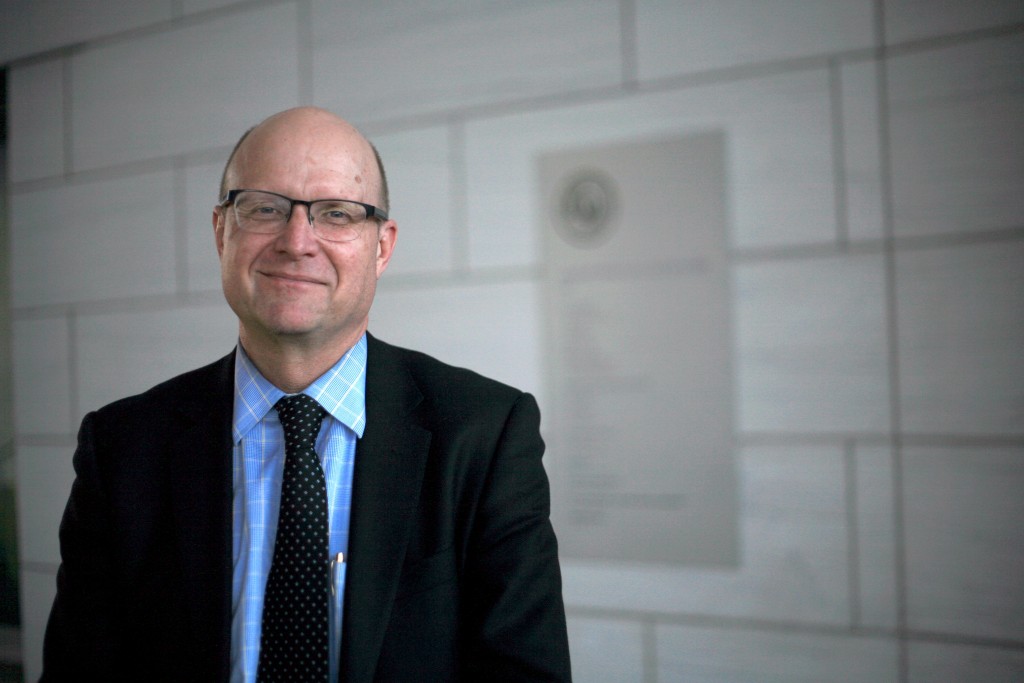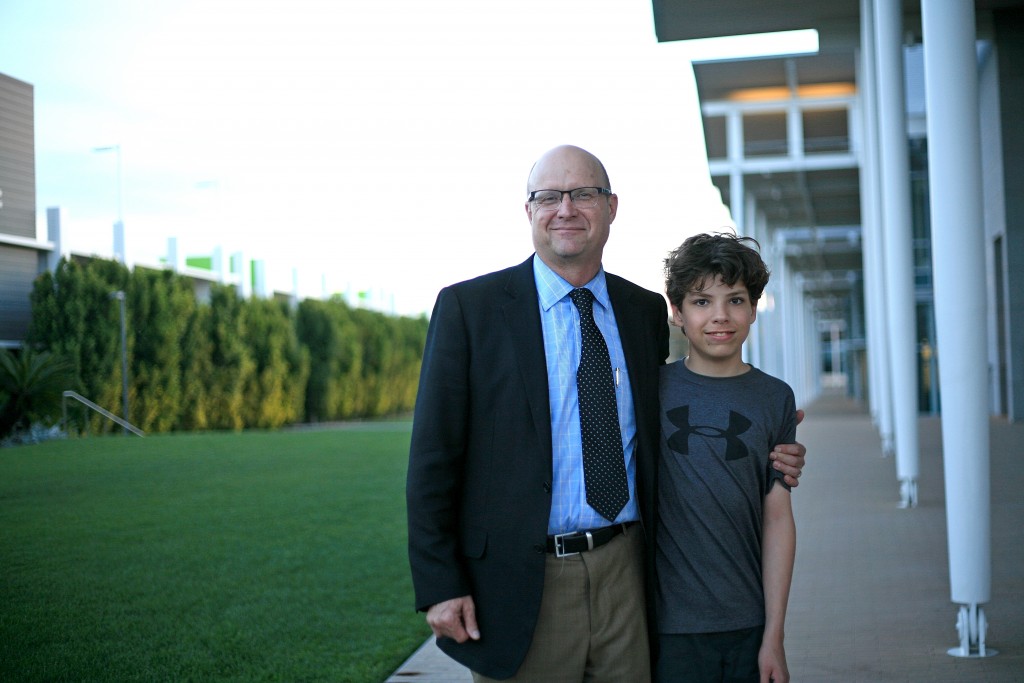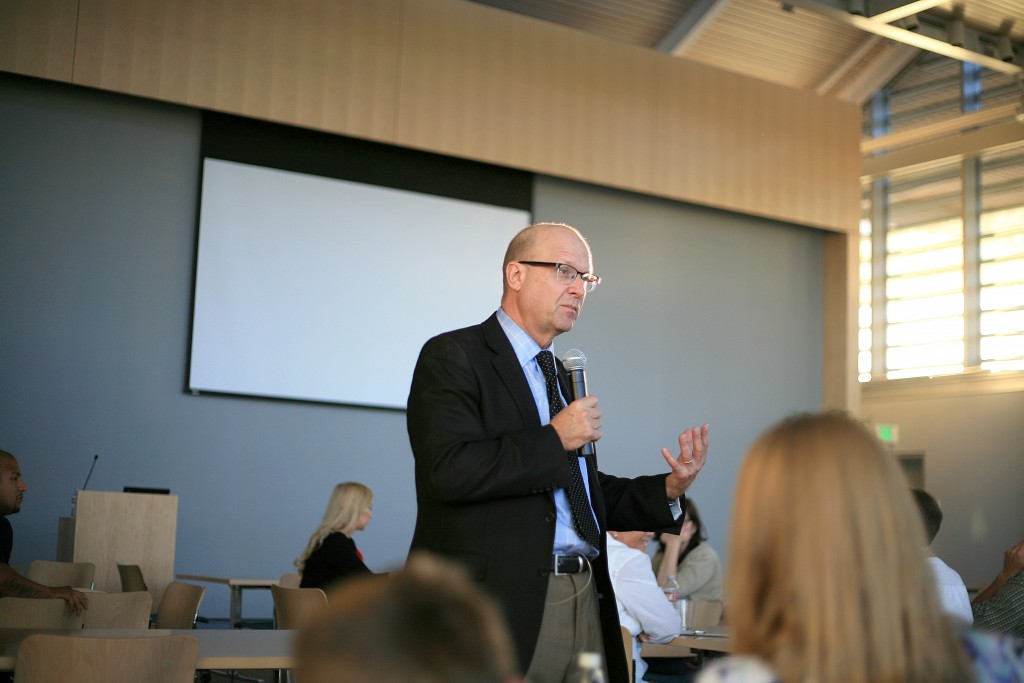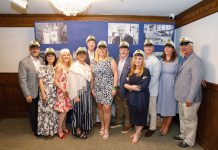
— Photo by Sara Hall ©
Late-talking children was the topic of an informative lecture held last month at the Newport Beach Civic Center community room.
Stephen Camarata, Ph.D., professor of speech and hearing sciences and associate professor of special education at Vanderbilt University in Nashville, Tenn., spoke at the free, public event, on March 14, organized by Newport Beach mom Cheryl Lessley.
The session helped “equip and empower” parents to support and advocate for their child, Lessley said. It gave them some powerful tools in their toolbox, she added.

— Photo by Sara Hall ©
Lessley, a Balboa Peninsula resident, has known Camarata for about 10 years, she said. He has been working with her son, Jack, since he was 3 years old.
“We are very blessed and fortunate that with a lot of hard work and great guidance Jack is a thriving middle schooler,” Lessley noted.
Camarata has genuine commitment and caring for his patients, she added.
During the event, Camarata discussed his book, “Late-Talking Children: A Symptom or a Stage?” and covered topics about why a child may not be talking, what to do with no diagnosis, how to advocate and support a late-talking child, and more.
The event went really well, Camarata said. There were several families he’s known and worked with for many years, while others in the audience were new to him, he explained.
“I feel like I was really able to reach them,” Camarata said. “They were a great audience.”
There was also a variety of age levels, one parent had a 21-year-old and another had a 2-year-old, he added.
“It’s really neat getting a diverse group of people,” he said.
Camarata plans on returning to Southern California, possibly Newport Beach again, in the fall after the release of his new book, “The Intuitive Parent: Why the Best Thing for Your Child Is You.”
The lecture was broken down into three sections: What is late-talking? What could it mean? and What to do about it?
“First and foremost, I’m a late-talker,” Camarata admitted.
He’s also the father of a late-talker, he added, so he understands the parents’ perspective. He recalled the discovery, diagnosis and process of working with his own son, including both the highlights and struggles.
Camarata told a lot stories and provided numerous examples that helped the audience gain a better understanding of the issues.
Late-talking refers to any child whose speech and/or language develops more slowly than other children, Camarata explained.
The basic criteria includes if the child isn’t talking by 18 months old, he noted. By that age, they should understand about 100 words or more.
Some of the risk factors for late-talking include premature birth, head injury, fetal alcohol syndrome, and more.
Things that do not cause late-talking include poor parenting, lack of essential nutrients, mercury, vaccines, and more.
“The evidence right now, and it’s really compelling evidence,” Camarata said, shows that “vaccines don’t cause late-talking or autism.”
When a child talks late, it could mean a number of things, he continued.
“It could mean nothing is wrong. It might just be normal variation,” he explained. “That’s actually a real possibility.”
Normal variation is the most common form of late-talking, Camarata explained. About 60 percent grow out of it, he noted.
“The odds are in your favor,” Camarata said.

— Photo by Sara Hall ©
It’s important to consider that, he said. But don’t just wait and see, he added, it’s equally important to have the child properly evaluated.
Other possibilities include a speech disorder, comprehension, intellectual disability, hearing loss, or possibly ADHD, or other conditions.
It could also be autism, Camarata added. Although all autistic children are late-talkers, not all late-talking children are autistic, he noted.
The first step in the process is to try to establish a differential diagnosis.
There are certain areas that should be assessed, Camarata explained. Those include speech, expressive language, receptive language (comprehension), intelligence (use non-verbal or low verbal test), and social skills (verbal and non-verbal).
A correct diagnosis is crucial for proper treatment, Camarata said.
There are no “magic bullets” or shortcuts in treatment, Camarata said. It could take years, he continued. Some kids may never talk.
Parents should be involved, not an obstacle, in treatment, he added.
“All of you should be given the opportunity to be included in the process,” Camarata emphasized. “You’re a partner in this.”
The parents should, above all, protect the child’s rights, Camarata said.
There are also a lot of strategies parents can utilize at home to help, he added.
“Don’t let your worry about your late-talker steal all the joy of raising them,” Camarata said later.
Camarata also spoke about speech disorders, Asperger’s Syndrome, Diagnostic Process Eligibility versus Differential Diagnosis, evaluation process, treatment process, and more.
Guests also had opportunities to talk one-on-one with Camarata during the breaks. The event ended with a Q&A portion.
Among the audience members were Chapman University Professor and Director of Communication Sciences and Disorders Program, Judy Montgomery, and Assistant Professor in the Department of Communications Sciences and Disorders, Janet Dodd.
As other professionals in the industry, it’s nice to see a researcher step out and offer help in this manner, they both agreed.
It’s a great interactive, parent-to-parent and parent-to-researcher, way for information to be shared, Montgomery noted.
“This is a vitally important topic and it’s wonderful when families get together like this and learn from the research,” Montgomery said. “Families rarely get this type of opportunity.”




